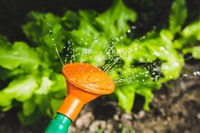Dakota Gardener: Watering and Waiting
(Click an image below to view a high-resolution image that can be downloaded)
By Carrie Knutson, Horticulture Agent
NDSU Extension - Grand Forks County
If you are reading this article, I hope you have stuck with me and listened to my advice on starting seeds. By now, you may have started a few seeds and your other seeds are waiting patiently in the wings. My oregano and thyme have been seeded, and I am patiently awaiting the first seedlings to emerge.
While we are waiting to start more seeds, let’s discuss watering and fertilizing your seedlings.
Watering seedlings indoors can be somewhat more complicated than watering plants in the garden or in containers outdoors. Indoors, soil moisture levels may not change very fast, or they might vary more depending on your growing setup. Fortunately, it is easy to monitor the moisture levels while you are looking to see what seedlings have popped up every day!
Water is essential for plants and helps roots to take up nutrients for plant growth. The roots need a mixture of both water and air in the potting soil to grow. Potting soil should be moist but not soggy. Too much water will decrease the amount of air in the media and lead to water-logged potting soil, which can result in seedling death, not how we want to start the growing season.
So how do you keep your seedling potting soil at just the right soil moisture level? The trick is letting the water and potting soil to do the work for you.
Did you know water is sticky? Water will stick to itself and to other particles, like those found in potting soil. We can use this characteristic to our advantage by simply watering our seedlings from the bottom up.
Regardless of what containers you use to grow your seedlings, the bottom should have holes for water drainage and be placed in a container to collect the excess water. Resulting in a route for the potting soil to take-up water. Instead of watering from the top, simply pour water in the container meant to collect excess water and wait for the media to pull up the water. You might have to add water several times as the water moves up the potting soil in the containers. Be sure to give the potting soil an hour or so to soak up the water and then drain the excess water from the bottom container.
Along with watering comes the application of fertilizer. Seedlings have all the food they need stored in their seed leaves until the plant can start producing its own food. Seedlings will benefit from water-soluble fertilizer applications, just not right away.
Wait to apply fertilizer until after the seedlings have several sets of true leaves. True leaves are leaves that grow after the first set leaves emerge from the potting soil. You can apply fertilizer at quarter- or half-strength for the first couple of applications and then fertilize at full strength.
I sure hope all our patience pays off this summer. I have had to remind myself to slow down more than once! Happy gardening!
NDSU Agriculture Communication – March 22, 2022
Source: Carrie Knutson, 701-780-8229, carrie.knutson@ndsu.edu
Editor: Kelli Anderson, 701-231-6136, kelli.c.anderson@ndsu.edu




